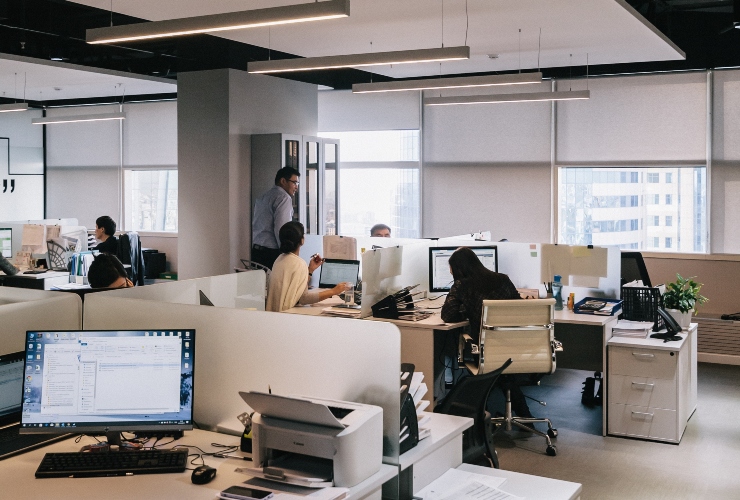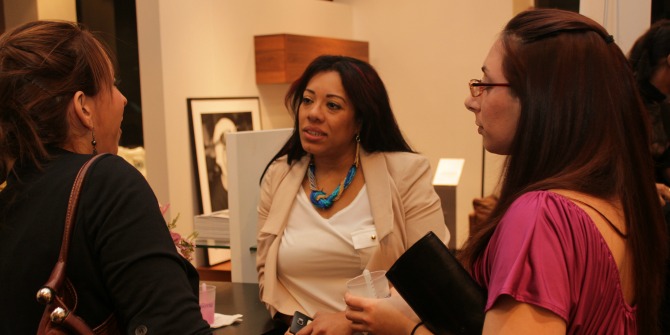
“I wonder if I will be able to string a coherent sentence together in a month’s time”
Kathy Samuel – head of business partnerships in the division of philanthropy and global engagement
What is different from working in the office?
The physicality of getting into the office provides a structure to the day. A few days in, I am feeling the need to recreate a structure to give focus and to be as productive as possible in these changed times. The first week I was going out for a walk to bookend the start and finish of the day, and a lunchtime stroll, but the seriousness of the situation will curtail that now.
What’s more difficult?
The work setup. Living in a small London flat, I don’t have available space to set up a dedicated work station. Plus also my husband is also WfH so negotiations have to take place about who is using what space, times to have space for video/voice calls.
What’s easier?
The transition to using Teams has happened with ease. Meetings are starting more promptly and are more efficient with use of time (don’t have the usual 10 min lag at the beginning of a meeting waiting for someone to arrive who has a diary of back-to-back meetings).
Business processes have had to be adapted to work around the situation and some well-established bureaucracy has disappeared overnight and I hope doesn’t return!
Surprises. How it affected your mood, and anything else I didn’t think of asking.
Back in ordinary work times, I relished a WfH day as it gave me opportunity to have a more freeform day and to also have quiet time to focus on some tasks I needed thinking time for. After a couple of days WfH, I realised how much I was missing going into central London, campus. I miss being active and moving about between buildings that came with everyday work life on campus.
Personal to me, I realise how the interaction with colleagues and being in the office kept my communication sharp. I feel my spoken communication is not as sharp as it was last week. I do wonder if I will be able to coherently string a sentence together in a month’s time!
“We want it to stay our ‘home'”
Wim Van der Stede – professor of accounting and financial management, and head of the department of accounting
Let me start by confessing that working from home was a lot more fun when it was optional instead of required. That is not surprising by any theory of human behaviour or motivation. People don’t like things imposed on them; it erodes their engagement and commitment. But this was not imposed by a boss who didn’t care to give his colleagues a say. It was thrust on us as an exigency. This rallies people’s collective spirit, causing them to rise to the challenge. A different but very powerful type of motivation. This is why everyone takes it in good stride. It is truly uplifting how colleagues have got on, are pressing on, and making it work (from home) – pun intended – with little or no time to prepare. In my immediate experience, I have heard no one complain. This is awe-inspiring.
All our gizmos make it more workable of course, even makeshift. I don’t care if it’s Teams or Zoom (although I have a preference), as the invitation makes connecting effortless by clicking a link, and voila. Oops, my old laptop has no mic. No problem, quickly also sign into the same meeting using my smartphone from the calendar invite on my phone. Next time smarter (now, with virtual meetings all the time, the next time is less than two hours later) by having my daughter’s basic earphones (the wiry thingies) plugged in. Next time smarter again by having a proper headset bluetooth pairing ready to go, plus two screens, as I now also have my tablet set up next to my laptop, plus my smartphone, too, if need be. A great amount of learning in a very small amount of time, and thus, a learning curve conducive to help “flatten the curve” by being able to and effectively working from home.
That said, if there is anybody who is not a WFH person in normal times, it is me. I have always made quite a separation between home and the office, probably spending an above-average time in the office (helped by having a short and easy commute). Home is home, not work, other than things I can do on my smartphone from the sofa like emails. It is this that I find needs the most getting used to: how and where to “make my office” at home? It’s not the technology: that I think is great, works as well as it should, and will only get better. I already used that extensively anyway from anywhere. It’s the work routines; the work-home rhythm. Of course, our “house” is now not only an office (two offices actually) but also a school (two grades actually), and yet, we also want it to stay our “home”. We manage, but in the first two days, we have been moving things around a lot. No cabin fever yet though.
As I said, the technology is generally great, even at a basic level; it’s amazing how far we can push our connectivity with our day-to-day devices. So good that some are already warning that we may find that we will continue some of these virtual practices long after we have returned to (the new) normal. That would not be a bad thing where it makes sense humanly, environmentally, and economically. But I personally believe that as humans we will also remain strongly drawn to the value of face-to-face interactions even if our meetings, teaching, and travel goes more mixed between in person and virtual. We will see.
One thing I already do (after three days only) is to not use video when I am having a meeting with just one other person. The phone for that still works remarkably well (like it did in 1999). We do not need to see each other every time we “meet” virtually, and we don’t need to reach for conference features on our laptops or tablets if the conference is really only a chat between two people. This may reduce screen and conference call fatigue.
On the whole, we manage, and we appear to be quite resilient. But we will always be human, too.
(Image by Nathan Fertig on Unsplash)
Now there is more community spirit in what can often feel like a very anonymous city
Sandra McNally – director of the Centre for Vocational Education Research and the education and skills programme at CEP, as well as professor of economics at the University of Surrey
 For me, this is the end of week 3 of working from home on a compulsory basis. I had an early start because I came back from Rome just before the national lockdown in Italy and when I got back, having a cold put me in a high-risk category (to others if not to myself). By the time it was established I did not have Covid19, most of my colleagues had started to work from home and now it is all of us.
For me, this is the end of week 3 of working from home on a compulsory basis. I had an early start because I came back from Rome just before the national lockdown in Italy and when I got back, having a cold put me in a high-risk category (to others if not to myself). By the time it was established I did not have Covid19, most of my colleagues had started to work from home and now it is all of us.
I really can’t complain. As an academic, working from home is entirely feasible and even productivity-enhancing. However, I am in the happy position of not having to teach this semester. My colleagues at University of Surrey have been exchanging numerous emails about putting their classes online. Many also need to juggle work with continuous childcare. I don’t know how they manage.
It’s taken a while to establish a consistent work pattern. I find that a very rigid one is best for me – a clear delineation between work time and free time. And whereas the news and social media used to be a distraction from more humdrum work tasks, I now find that work takes my mind off the anxiety-inducing news.
I’ve become much more appreciative of the power of technology to keep in touch with people. Although I miss all my activities and being around other people, being regularly tuned in on some newly-found app enables the opposite of ‘social distancing’. My elderly aunt has been introducing all her friends to the joys of FaceTime. It is good to see that the virus is not the only thing capable of rapid transmission!
Like many others, I wonder if this time in relative seclusion will change me and my work in the longer term. I hope it does. I’ve come to better appreciate the jobs of ‘key workers’ who keep the show on the road during a crisis. There is more community spirit in what can often feel like a very anonymous city. This is an awful time, yet it has also brought about much goodness and generosity in people and given more space (at least for some of us) to reflect on what’s important.
(Photo by B_Me, under a Pixabay licence)
“I can hear birdsong”
Helen Ward – communications manager at the Centre for Economic Performance
 “All we can hear”, said the Italian woman on the news, “are church bells and emergency sirens”. It’s not like that in London, yet. As I write this, from the settee in my front room, it’s the first day of lockdown and I can hear birdsong.
“All we can hear”, said the Italian woman on the news, “are church bells and emergency sirens”. It’s not like that in London, yet. As I write this, from the settee in my front room, it’s the first day of lockdown and I can hear birdsong.
And that’s not all – the North Circular rumbles on, this morning the rubbish collectors came by, this afternoon the postman delivered my son’s Match of the Day magazine (it is an “activity special”). Then there are the sounds of children, who would normally be at school, playing.
I’ve now worked from home for seven days. I run the @CEP_LSE Twitter account, and today I tweeted Vox.com’s interview with Nicholas Bloom, economics professor at Stanford University and a CEP associate. Professor Bloom conducted a famous study of a Chinese travel agency, which found that working from home made employees more productive and less likely to quit – perhaps, asked the interviewer, lots of people working from home could be a good thing?
No. Professor Bloom pointed out that context is all – working from home can be lonely and isolating. In the study it was voluntary and part-time, now it is compulsory and full-on. We all understand the necessity, but still productivity will be affected. Mental and physical health will be affected. Bloom suggests recreating social contact with colleagues through video conferencing – chatting, not about work, but to catch up. Managers could also make time to talk individually with employees.
And that is what we are doing at CEP. Three times a week, our group of seven support staff have an 11am virtual coffee. I dial in from my laptop – it’s balanced on my “adjustable desk” aka the ironing board. I like this coffee time. It’s a break from these days in which things go wrong: I crash out of zoom meetings, forget passwords, the Skype ring tone has invaded my dreams. But I am not complaining, I am grateful to have this work, at this time. Although my thoughts do sometimes wander to the dregs in my office coffee cup that will now sit untouched on a sunlit desk for months.
The CEP’s founder director Richard Layard has talked about the things we need to do every day to keep our spirits up (the challenge of supermarket shopping means we are certainly all trying out new things). He believes that going through this very hard time could lead to a society with more fellow feeling.
I hope so. Above all, I hope we will all get through this. That our families stay safe and well. That in 12 weeks (or sooner, or later) we will all be back – to hear colleagues grumbling about their tube ride, to chat with people in the real Bean Counter cafe, to give the IT team a standing ovation. And I shall wash up that coffee cup.
(Image via OpenClipart-Vectors, under a Pixabay licence)
Thank God for my clingy cats
Sonja Grussendorf – senior learning technologist
 I’m part of the team tasked with moving our academic colleagues to teaching and supporting learning online. I’ve had an interesting two weeks, where “interesting” does not do the experience any justice.
I’m part of the team tasked with moving our academic colleagues to teaching and supporting learning online. I’ve had an interesting two weeks, where “interesting” does not do the experience any justice.
My workday – voluntarily, self-imposed– starts at 6.30 and ends at 16.30. I am a lark where most of my colleagues are night owls and I find it difficult to think coherent thoughts any later than 6pm.
Surprisingly, I have seen and heard more of my colleagues in the last ten days than I usually do in the office. I feel close to and supported by them all; we meet in zoom and teams and moan a bit and laugh a lot (though some of that may be overwork hysteria).
When I do my bit in eden.digital (first port of call for eLearning queries) I have shifted tonally from what used to be soothing hand-holding to efficient, short pointers to our wiki guides. However, the response from academic and PS staff has only been understanding and effusively grateful, they write only when really stumped and I thank them all for that. Zoom still allows us to continue giving ‘intimate’ care and guidance both to individuals and groups. This week a definite highlight was ‘zooming’ with an academic in our pyjamas at 7am, when her spouse in dressing gown brought breakfast and waved at me.
I hope that all these positive changes will stay with us beyond the Covid-19 crisis. In particular, educational technology has long had a ‘step-child’ status within the higher education sector. I believe that it has become a little clearer that EdTech expertise is quite valuable.
There has been one negative development: if the virus doesn’t get me, my lifestyle will. Being at work prevents me from smoking as much as I now do. That’s nobody’s fault but my own, of course. Anyone have advice, email me.
Finally, as with everything in life that you only miss when you no longer have it, I learnt that physical contact is incredibly important. My mother is celebrating her 80th birthday on Friday in the Netherlands, and as all of her four daughters live in different countries (USA, UK, D), we will have to do it via zoom (courtesy of the new LSE license, thank you!).
My partner does not live with me and for the foreseeable future I will not be able to see him. Luckily I have very clingy cats that are giving me a lot of love, though I resent them for their flouting the lockdown rules. My neighbours are fantastic, we are shopping for each other, sharing food, advice, stories and jokes, and are planning a doorstep dance party.
If all of that seems a little too happy-clappy, then it’s early days and what else can you do but put a positive spin on everything? It’s the end of days, so we may as well go down with a bang, not a whimper.
(The author’s cats, Samson and Delilah by Sonja Grussendorf )
We all thank technology, but…
Helena Vieira, managing editor of LSE Business Review
 Many of us who are not health experts may have missed the early signs of a pandemic, and went about our business blissfully ignoring the emergency fast approaching our doorstep. So, it came to me as a surprise that LSE was able to switch gears and become an online organisation in what seemed to me like the blink of an eye. I’m sure that’s not what it looked like for the management and technology teams. I can imagine the long, stressful hours they put in to make this transition work. We all thank technology for the ability to stay professionally active and connected. Like many of my colleagues, I had more meetings last week than I would usually have, and work flowed at a steady pace, with the help of technology. It doesn’t escape my attention that this can be the death knell of whatever remained of our privacy. Even more of what we do now is mediated by technology. Work meetings, family meetings, and now even our parties have gone online. What a godsend for the data extraction lords. They won’t exactly tell you what they’re doing. The risks to our freedom are not insignificant.
Many of us who are not health experts may have missed the early signs of a pandemic, and went about our business blissfully ignoring the emergency fast approaching our doorstep. So, it came to me as a surprise that LSE was able to switch gears and become an online organisation in what seemed to me like the blink of an eye. I’m sure that’s not what it looked like for the management and technology teams. I can imagine the long, stressful hours they put in to make this transition work. We all thank technology for the ability to stay professionally active and connected. Like many of my colleagues, I had more meetings last week than I would usually have, and work flowed at a steady pace, with the help of technology. It doesn’t escape my attention that this can be the death knell of whatever remained of our privacy. Even more of what we do now is mediated by technology. Work meetings, family meetings, and now even our parties have gone online. What a godsend for the data extraction lords. They won’t exactly tell you what they’re doing. The risks to our freedom are not insignificant.
(Image by 422737, under a Pixabay licence)
♣♣♣
Notes:
- This blog post expresses the views of its author(s), not the position of LSE Business Review or the London School of Economics.
- Featured image by Ewan McIntosh, under a CC-BY-NC-2.0 licence
- When you leave a comment, you’re agreeing to our Comment Policy.







1 Comments